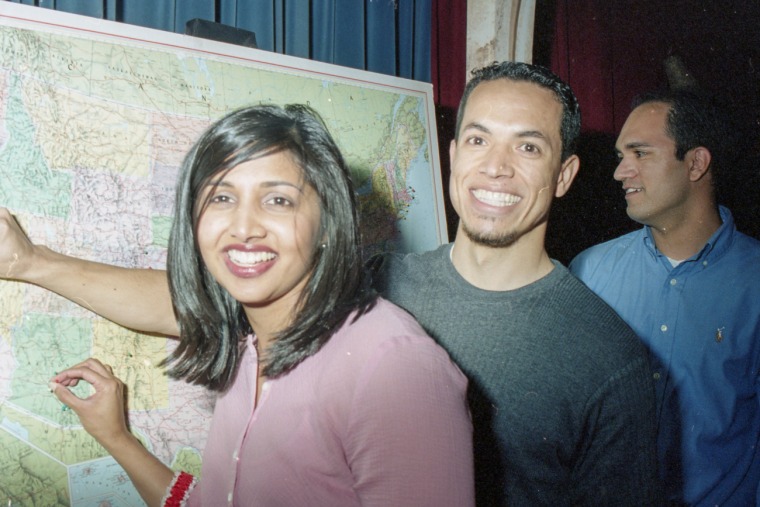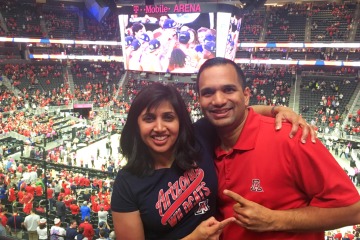MedCat makes colonoscopy a little less scary
A Class of 2003 alum is creating a comfortable setting for women to receive colonoscopies — a lifesaving but often stigmatized medical procedure.

On Match Day 2003, Deepa Shah learned she had matched to an internal medicine residency at Banner University Medical Center Phoenix (then known as Banner Good Samaritan Medical Center).
Class of 2003 MedCat Deepa Shah, MD, initially wanted to go into women’s health, but found her home in gastroenterology. These days, as a physician at HonorHealth in Scottsdale, she combines both interests as she helps female patients confront the anxiety that often surrounds colonoscopy.
“Colorectal cancer is the third-most commonly diagnosed cancer in women, and the third-most common cause of cancer deaths in women,” she said. “My big goal is to help get more women screened.”
To reach that goal, Dr. Shah helped form Women GIving Care — the “GI” stands for gastrointestinal — an all-female crew providing colonoscopies to female patients. She says it’s the first formalized program of its kind in Arizona.
“You have a female nurse in the pre-op area doing your IV and questionnaire. Then you go into a room with a woman gastroenterologist, a woman anesthesia provider, a woman tech and a woman nurse. In the recovery area, you have a woman recovering you,” she explained.
While everyone may face barriers to colonoscopy — such as the need to secure transportation, and apprehension about the bowel prep and anesthesia — women sometimes have a few extra, ranging from beliefs about modesty to histories of sexual trauma.
“There’s a lot of stigma behind colonoscopy. Data suggests that women have lower rates of screening than men,” Dr. Shah said. “People have gravitated to Women GIving Care because of religion, PTSD, embarrassment, or they had a bad experience in the past. We have captured a good amount of people who otherwise wouldn’t have received a colonoscopy. It’s been a game-changer for a lot of women.”
‘The vastness of GI’
As a child in El Centro, California, along Interstate 8 between Yuma and San Diego, Dr. Shah knew she wanted to be a doctor someday. Her location and her goals strongly influenced her choice to enroll at the University of Arizona.
“I wanted to go to a school that was close, but not too close,” she recalled. “I wanted to go into medicine, and I really liked that it had a med school.”

Dr. Shah, pictured here with her husband, says Arizona Basketball is “one of my passions.”
As an undergraduate in molecular and cellular biology, Dr. Shah met her future husband, Nihaal Rao, an economics major at the Eller College of Management. After graduation, he moved to Phoenix while she matriculated with the College of Medicine – Tucson Class of 2003.
“I really liked that it was a very diverse class. The average age was 25, and a lot of people had life experiences — we had a former lawyer, single moms,” she recalled. “You could tell the professors were there because they wanted to be there. They were committed to education.”
Before the College of Medicine – Phoenix was established as a separate college, MedCats could choose to perform their third- and fourth-year clinical training based out of Tucson or Phoenix. Because her boyfriend was already there starting his career — they would eventually marry the same month she completed her medical degree — it was an easy choice for Dr. Shah.
She gravitated toward women’s health, and even helped deliver a baby in Queen Creek as part of the Rural Health Professions Program. But during her training, as she was exposed to different medical specialties, she found her true passion.
“What initially appealed to me about internal medicine was that it was very diverse. You’re unifying lots of things within the body, putting the pieces together, trying to figure out a problem,” she said. “Everything came together for me when I did a GI rotation at the VA. You’re dealing with lots of systems — the gallbladder, pancreas, esophagus, reflux, polyps, hepatitis C, all sorts of things. I liked the vastness of GI.”
She also found that she had the “personality” of a gastroenterologist.
“You have to be a little funny, a little easygoing — I mean, you’re doing colonoscopies!” she said, laughing.
‘Preventing cancer and saving lives’
Colorectal cancer is foreshadowed by polyps, clumps of cells that form in the colon and sometimes turn into cancer, but can be detected and removed during a colonoscopy.
“A lot of people don’t have signs or symptoms, but will still have polyps,” Dr. Shah said. “If we’re removing polyps, we’re preventing cancer and saving lives.”
Colorectal cancer incidence is on the rise among young and middle-aged people. In response to these sobering statistics, in 2021 the recommended age for first colonoscopy was lowered to 45. Anyone at higher risk, such as those with certain genetic mutations or family history of polyps or colorectal cancer, should receive their first colonoscopy at an even younger age.
Dr. Shah recalls one patient, a former endoscopy nurse who had put off her colonoscopy until she was in her 60s.
“This is a woman who’s been in the thick of it. She’s been in the room, she knows it can be embarrassing,” Dr. Shah said. “She chose our program to have her colonoscopy. She was such a great fan, and she felt so comfortable.”
Dr. Shah is one of five gastroenterologists who participate in Women GIving Care — a number she is proud of, given the scarcity of women in her field.
“Is one of the barriers to colonoscopy not having enough women GI providers?” Dr. Shah asked. “It’s a very male-dominated specialty. There are more women matriculating in medical school than men, and more women are entering the field of gastroenterology — not at the rate we would like, but it’s going up. I see it changing.”
For Dr. Shah, the positive response to Women GIving Care has been tremendously rewarding, and she loves that the most important part of her job helps fight cancer.
“Colonoscopy is one of the tools we have for preventing colon cancer,” she said. “Go out there and get screened!”

